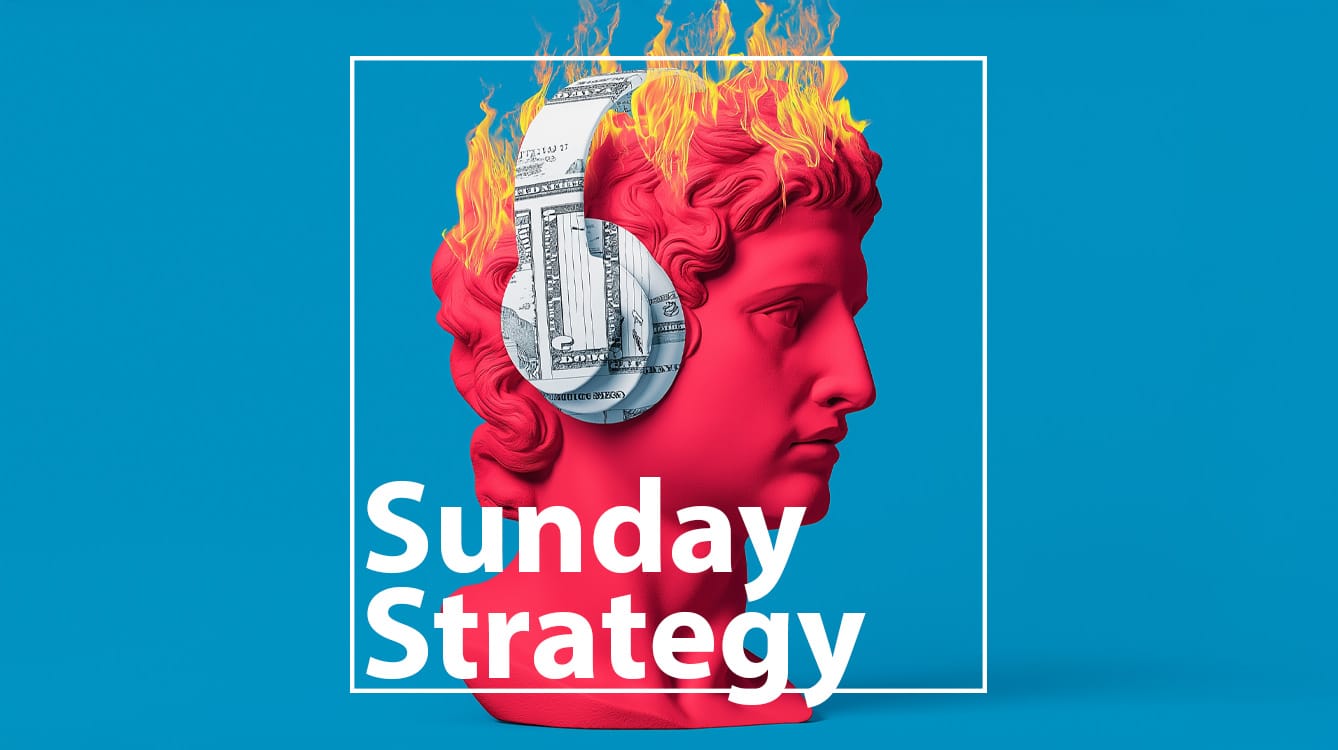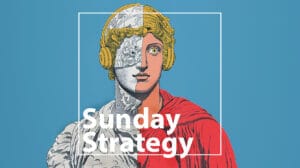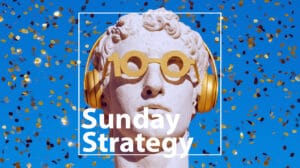In this issue of Sunday Strategy, we look at five stories to think about next week, including: Tariff Anxiety vs. Polarization, Robot Flirting Coaches, the Failure of Activist Marketing and Space Travel Jumping the Space Shark.
In addition, we have ads from: SickKids, HR Block, Amazon, PETA and Duolingo. If you’d rather listen to this issue, check out our podcast below:
// Five Stories of the Week:
1.) United in Anxiety, But Polarized by Politics.
While US trade tariff announcements have rattled markets and sparked outrage and fear around the globe, have we actually begun to experience the bulk of their impact yet? The tariff shock so far, has come more from estimates of $2,300 iPhones, expensive sneakers and higher grocery bills on the horizon than what is in our carts today. Fear of what’s to come is amplifying uncertainty and driving consumers to brace for a punch we can’t track – causing even Reddit’s ‘Wall Street Bets’ to start discussing restraint. This anticipation is accelerating the discussion of the ‘death’ of the middle class across sectors from restaurants to cars, as well as spurring countries to discuss what free trade around the US looks like.
However, the anxiety has yet to unify how Americans see the economy and measures. Though consumer confidence has roundly declined in the run up to the tariffs, the value and long term impact of tariffs still splits on party lines. While 52% of Americans believe tariffs will do more harm than good according to IPSOS, 87% of Democrats agree vs. 21% of Republicans. Additionally, 64% of Republicans currently believe tariffs are a good idea even if prices increase versus 27% of independents and 6% of Democrats. While everyone is worried about what happens next, anxiety has yet to bring the US together around if it’s worth it. Whether this changes as tariff pain increases has yet to be seen, but for now, it’s one anxious nation still divided by party lines.
2.) Robot Practice for Human Flirting.
Gen Z singles are increasingly becoming a relationship version of Schrodinger’s cat – with a love life simultaneously dead and alive. From stories about giving up on relationships to a love of sex parties, younger daters are faced with a dating landscape that’s simultaneously scorched earth and Burning Man.
Add into this AI and we find ourselves in a moment where human relationships are potentially challenged by artificial ones, even if those have yet to provide the same level of social value. While research has shown AI may leave users lonelier than before, dating app Tinder has taken steps to use AI to make you better at forming human relationships. Their latest feature, ‘The Game Game’, uses OpenAI to allow users to practice new lines and perfect flirting. The experience has been reported to be a little ‘cringe’, but perhaps that’s the point. Should we expend our cringe on artificial relationships, so the real ones feel better? Or is cringe part of the human experience – more a feature than a bug?
3.) The Failure of Activism as Marketing.
Did the age of ‘brand purpose’ give way to the anti-DEI, ‘dark mode’ shift we’re seeing today? It certainly didn’t help. As Eugene Healey outlines in the Guardian, the need for brands to be ‘supported’ in adopted causes and the wider commodification of purpose as a marketing tool cheapened good acts. While marketers may have had good intentions, commoditized purpose has had unintended consequences for language (the vilification of terms like ‘woke’), activism and wider attitudes. As activism is more needed than ever, brands’ silence on many issues only highlights how purpose was seen all along.
However, as the piece highlights, this vacuum may give way to more grass roots, committed or authentic activism. It’s sorely needed and I think there’s still a place for brands to be involved, as long as they are the supporters not demanding support. We may be discovering what some have known all along, social purpose is a long term investment with an uneven direct return – something many businesses won’t be comfortable with. However, for those that can put purpose on their balance sheet over their press releases, it can still create mutual good. The failure of this iteration of activist marketing may hopefully be giving way to something more focused, pragmatic and effective – which may be just in time.
4.) Are We Already Over Space Travel?
Going to space has always seemed like something pretty cool, but is that changing in the age of space tourism? Actress Olivia Munn’s apathy towards a recently announced all-female Blue Horizon mission, including Katy Perry, Gayle King, Amanda Nguyen and founder Jeff Bezos’ fiance Lauren Sanchez, may indicate that just ‘going for a ride’ into space doesn’t have the same cache as space exploration once did. Are we poised to judge space travel in a new way?
A 2023 Pew research survey may have already indicated this is the case. While 47% of Americans said they engaged in a ‘space related activity’ in the last year, only 35% said they would be interested in going into space and orbiting the Earth, down from 42% in 2018. Between publicity around rocket and launch failures, the current $150k price tag and economic worries, is space becoming something we’d rather ‘give more space’ to? If so, space tourism has an interesting challenge on its hands – in not just lowering the cost, but raising the desire to be an astronaut.
// Ads You Might Have Missed:
1.) ‘The Count’ – SickKids:
Canada’s ‘Sick Kids’ foundation and its long running brand platform have successfully given a fighting tone to childhood illness, eschewing the stereotypes of helpless children to show them as fighters against the illnesses they face. While the overall impact of ‘fighter’ language when it comes to illness is debatable, the ads are distinct in how they hero sick kids and position the cause.
Their latest ad, ‘The Count’ speaks to the foundation’s 150 year anniversary while also talking about the passage of time and lives cut short – stating powerfully that ‘when every year is a fight, each birthday is a gift’. Overlaid with an actual count, the ad features children experiencing recovery, surgery, loss and the struggle for life. In its totality, the ad shows how a platform can differentiate even the most valuable brands – making people care beyond lip service or obligation to want to join in.
2.) ‘Make It Legit’ – HR Block:
The gig economy, side hustles and second hand marketplaces have made self-employment a wooly concept, with many people who actually are their own business feeling like they’re not. Though as tax rules change, with the reporting threshold for gig economy and online marketplace revenue in the US reducing from $20k to $5k, lots of people are now taxed like small businesses, even if they don’t feel like them.
HR Block has taken this insight to power their latest campaign ‘Make It Legit’ offering these gig workers tax support and the chance to win small business marketing support, because if they’re taxed like a business, they should be marketed like one. The campaign features three small businesses in their ads so far, including ‘Pickle Pete’ a bagpiper, in a pickle costume’ for hire. While Pete may not resonate with most gig workers, the sentiment and insight behind this campaign deftly tap into the changing nature of employment and the gap between how people feel vs. how the tax code sees them.
3.) ‘Mile High UTI’ – Amazon:
Amazon’s move into medicine and pharmacy has been an intriguing case study in convenience. You may not trust one of the world’s largest retailers, but its ubiquity and the convenience it offers you buys the brand a place in your life. Whether this can extend into your health is an open question, but if their latest campaign is anything to go by – they think it can.
‘Mile High UTI’ is one of a series of ads that puts forward the simple premise – easier, faster healthcare from the big brand you know. Showcasing its app and its delivery time, you could easily tweak this into an ad about delivering toothpaste – but Amazon subtly extends into medicine instead. While other brands try and champion fixing the broken healthcare system, Amazon shows how making the broken easier may win over more customers. As Apple and others mull further steps into medicine, Amazon may have recognized the fastest way to establish themselves in the space first.
4.) ‘Duolingo World Cruise’ – Duolingo:
This year’s April Fool’s jokes from brands didn’t have an easy set-up. With a looming global trade war, inflation and economic chaos, trying to get people to care about a brand’s fake products and services felt like a high bar. However, as always, the brands that truly commit to something, combining hyperbole and just enough believability can still win out.
Duolingo is well versed in this mix from their daily marketing efforts and delivered again with the ‘Duolingo World Cruise’. Seemingly partnering with Carnival Cruises to offer a global 5 year ‘semester at sea’ style experience, the brand creates a promo video and social content that hooks in with enough realism before going off the rails. Like previous fake Duolingo campaigns, it also rewards those who cared to click with free Duolingo and cruise discounts. In an uneven economy where global cruises sit next to recession news, this felt believable enough to follow along, even if you never really thought you could buy.
5.) ‘Being Vegan is Good Shit’ – PETA UK:
PETA’s latest ad spurs the question, “Who is this for?”. For cause marketing around animal rights, veganism and vegetarianism, this isn’t a rare occasion – as these ads often have to strike the delicate balance of being truthful enough to show the reality of animal welfare, without alienating an audience they want to recruit.
However PETA’s latest entry in the UK takes a different route to promoting veganism, moving from animal health to bowel health. ‘Being Vegan is Good Shit’ takes a synthwave beat and expounds on how fiber rich vegan diets are less ‘shitty’ than others. The poop emoji has a dumpy and broccoli has muscles in this music video, but I’m left wondering who the audience is when I consider ‘if it works’.
For non-vegans, its message may get lost in a wider cloud of confusion and indifference on gut health. For vegans though, this does a great job of reminding you why you’ve made that choice. Similar to many cause ads, this ad does a much better job of preaching to and retaining the converted than recruiting new believers.
// Sunday Snippets
// Marketing & Advertising //
// Microsoft at 50 years old: A look back on everything from Office to the Zune [Brands]
// Spirit Airlines take to Instagram to tell the truth about low cost travel [Social Media]
// The ResX team’s April Fool’s push notification hit too hard [Social Media]
// But no one is ready for Veselka’s ‘Breath Mint Perogies’ [Food]
// As US brand Hooters declares bankruptcy, the Atlantic asks if it was too naughty, or not naughty enough? [Food]
// Man rents Cyber Truck and counts how many times he’s flipped off in a day [Culture]
// Natural Light brings back “Home Improvement”’s Richard Karn in nostalgia laced April Fool’s campaign [Ads]
// Norway takes to TikTok to teach the vocabulary of the country [Social Media]
// Grubhub announces plans to bring back delivery brand Seamless [Brands]
// Hershey buys Lesser Evil for $750m [Marketing]
// John Cena goes full wrestling gimmick for a new Neutrogena ad [Ads]
// Technology & Media //
// Daft Punk announce an Abba Voyager style hologram perma-concert venue in Paris. But shouldn’t it just be animatronic? [Music]
// Midjourney have released version 7 of their image generation model, the first in nearly a year [AI]
// Meta has released two new Llama models, Scout and Maverick [AI]
// Life & Culture //
// New York cost of living is so high, even the Teenage Mutant Ninja Turtles are moving. [Culture]
// Meet the Polish LARPers who pretend to be American [Culture]
// Inside the ‘Torpedo Bats’ that are blowing up baseball [Sports]
// Why ‘Intentional Clutter’ is the new Maximalism [Culture]
// A court has ruled London buskers can be considered psychological torture [Music]
// People doing intense exercise are found to experience time more slowly [Sports]
// Until Next Sunday
As always, let me know what you think by email (dubose@newclassic.agency), website or on LinkedIn.You can also listen to an audio summary and discussion of each week’s newsletter on Spotify. We’re also on TikTok!





